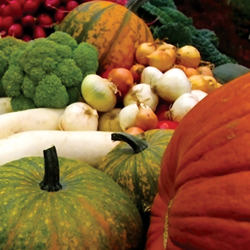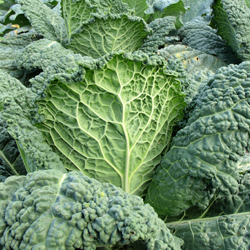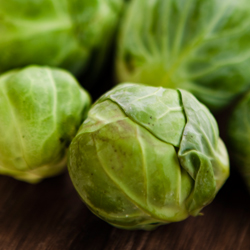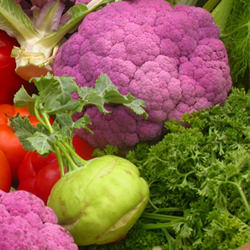Winter marks a seasonal change. Our bodies seem to crave deeper, more tantalizing, richer tastes rather than light, bright, fruity flavors of summer. Harvesting vegetables in the late fall, and sometimes into the winter, presents us with bounty for slow, simple and savory cooking. All winter vegetables may be boiled, roasted, grilled, stewed, sautéed, steamed or eaten raw.
Which Vegetables Are Winter Vegetables?
Winter vegetables are generally considered those that are either harvested late in the season or have the capability of being kept for several weeks or months without losing their flavor, texture and nutritional value. Which of these will grace your table?
The cole, or cruciferous, vegetables such as broccoli, Brussels sprouts, cabbage, cauliflower, turnips and kohlrabi rank highly for many nutrients including vitamin C, soluble fiber and other nutrients with anticancer properties. Interestingly, boiling seems to reduce the potency of these nutrients, but other cooking methods don’t.
Root crops, including beets and carrots, sustain life around the world. Beets provide folate, nitrates and manganese in dishes such as borscht and pickled beets. Carrots contain diverse vitamins including A, C, K and B6 and antioxidants from carotenoids. Interestingly, recent research suggests many people prefer the flavor of steamed carrots to boiled.
Fennel, with its anise flavor, jazzes up meals throughout the world but is a favorite in Mediterranean and Italian cuisine. It tops nutritional lists with its antioxidant benefits. Try some raw in salads and appetizers.
Celery, related to fennel, adds a distinctive crunch when used in salads as a raw ingredient or a stronger flavor to soups and stews. With a mild taste, celery is versatile in a wide range of dishes, including mashes, stuffings and roasts.
Potatoes and sweet potatoes, long associated with the typical American holiday meal, contain many healthful benefits. According to research, boiling or steaming sweet potato provides the most health benefits; the phytochemicals in them rival that of broccoli. Roasting or baking potatoes is a healthy way to enjoy them, provided you are sparing with the toppings.
Winter squashes, from acorn to pumpkins, also serve as healthy sources of carbohydrates. Because 90 percent of the calories are starch-related, people are surprised at recent studies proving the antioxidant, anti-inflammatory and insulin-regulating effects of winter squash. Additionally, the roasted seeds make a delicious and healthful snack.
Winter Vegetable Recipes to Savor
Have you ever wondered how to roast vegetables? It’s easy! Just wash the vegetables, cut into 1″x1″ cubes, and place in mixing bowl. Drizzle over a few tablespoons extra virgin olive oil and mix to cover all pieces. Place as a single layer in a cookie or roasting pan. Sprinkle with salt and pepper and cook at 375⁰ Fahrenheit for approximately 45 minutes or until the desired texture is reached. Jazz it up with cinnamon, garlic, curry, rosemary or any other favorite spice or seasoning mix.
Here are some other recipes to bring these wonderful winter vegetables to your table. Bon appétit!
Roasted Winter Squash Seed and Cheese Ball Appetizer
Step 1: Roast winter squash seeds by cutting the winter squash in half and removing the seeds and stringy “gunk.” Put into a bowl half filled with water and rub between your hands to separate the seeds from the strings. Rinse the seeds again and spread out on a cookie sheet. Use a hair dryer or place in 150⁰ Fahrenheit oven to dry. Stirring every 10 minutes reduces drying time and ensures even drying.
Step 2: When dry, place seeds in bowl and combine with choice of seasonings. Mix thoroughly. Return to cookie sheet. Place in 275⁰ Fahrenheit oven for 10-20 minutes. Watch closely to prevent burning. When cool, chop finely to coat cheese ball.
Seasoning ideas
- Latino: 4 Tbs. melted butter, 2 tsp. chili powder, 1 tsp. oregano
- Asian: 4 Tbs. melted butter, 2 tsp. ground ginger, 1 tsp. hot mustard, 1 tsp. honey
- Holiday: 4 Tbs. melted butter, 2 tsp. cinnamon, 1 tsp. nutmeg, 2 tsp. sugar
- Use your imagination!
Step 3: Make cheese ball.
Ingredients:
2 pkg. (8 oz. each) softened Neufchatel cheese
1/2 cup shredded sharp cheddar cheese (Low fat)
Directions:
Beat Neufchatel and cheddar in small bowl with mixer until well blended. Refrigerate 1 hour. Shape into ball. Press seasoned winter squash seeds onto cheese ball.
Serve with complimentary crackers, tortilla chips, pretzels or flatbread.
Winter Squash Casserole
(serves 2)
Ingredients:
2 Cups winter squash, peeled and cut into 1-inch cubes
3 Tbs. extra virgin olive or macadamia nut oil
1 tsp. orange juice
1 tsp. lemon juice
Directions:
Steam squash chunks, covered, for 7-8 minutes, until just tender
Mix remaining ingredients, pour over squash in bowl
Toss while still warm. Serve.
Other Ideas:
- Cook 1/2 C chopped onion with squash, or
- Add fresh herbs such as basil or rosemary to liquid dressing, or
- Sweeten with 1 tsp. cinnamon and 2 tsp. honey, or
- For Asian flavoring, add 1 Tbs. minced fresh ginger, 2 tsp. soy sauce
Super Easy Grilled (or Baked) Cauliflower
- Remove the leaves. Cut the head in two, core the stem. Place both on large piece of heavy-duty foil.
- Melt 1/2 Cup butter with 2 tsp. garlic salt and 2 tsp. lemon pepper.
- Drizzle half of butter mixture over each half and sprinkle each with 3 Tbs. parmesan cheese
- Rejoin the two halves and drizzle remaining butter mixture on the outside.
- Fold foil around, creating a ball.
Cook at 350⁰ Fahrenheit for approximately an hour or until soft. Delicious!












